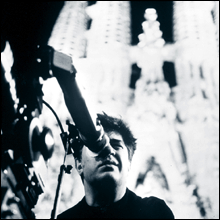![[Sidebar]](/standard/image/sidebar.gif)
![[Movie Reviews]](/standard/image/headers/movie_reviews_header.gif)
| by movie | by theater | hot links | reviews |
Indie 2000
Palm Springs goes its own way
by Gerald Peary
Pedro Almodovar
I assumed that last year's guest visit to the Palm Springs International Film Festival would be my first and final appearance there after the "Film Culture" column in which I described the fest as drowning in dubious American indie films. But no, I was invited back for 2000. Palm Springs organizers actually endorsed my view that those last-year independents were terrible. They would try to alter the fest's focus, and for the better. "We pulled back on American films because we can't compete with Sundance at the same time," Jennifer Stark, associate director of programming, explained to me. "We decided to put together our own unique package."This is what we got in January 2000: (a) an all-star panel of international filmmakers (cosponsored by Variety), with Milos Forman (Czech Republic), Hector Babenco and Carlos Diegues (Brazil), and Pedro Almodóvar (Spain) all discussing the problems of getting non-Hollywood films into theaters; (b) a shift of emphasis to world cinema, including about 20 new Italian movies, surely more than any festival in the world; (c) a showcasing of the Oscar nominees for Best Foreign Film; and (d) a three-day cinematography meeting in which many of the greatest camerapersons on earth met informally to discuss film preservation, the digital revolution, and the challenges to Hollywood that Denmark's Lars von Trier and his Dogme devotees represent.
I was won over. Where else could I have a chat with Subatra Mitra, the octogenarian cinematographer of Satyajit Ray's Pather Panchali and Aparajito, who was flown in from Calcutta?
But would the Palm Springs audience -- mostly sun-and-golf-and-Gerry-Ford retirees -- go along with the shift to insider film issues and to so much foreign-language cinema? "Absolutely," Stark said. "Probably 50 percent of our audience are local. If we didn't have that kind of homegrown support, our festival would have a difficult time."
Stark proved correct. No surprise that a theater was packed for ancient Kirk Douglas, who made a halting appearance with Diamonds, his new Miramax picture, noting, "I did it after I had my stroke. I thought I would never make another movie again until silent movies came back." But the senior folks were also there in numbers for Bishonen . . . Beauty, a Hong Kong picture about male hustlers that was chosen by Danny Acosta, the fest's newly appointed gay-and-lesbian programmer. And one of the highest-rated films in an audience poll was among the creepiest and most challenging: After the Truth, a German film imagining that Nazi doctor Josef Mengele is still alive and is voluntarily returning home for an Eichmann-style trial.
Now, several quotes to ponder from the lively International Filmmakers panel.
Hector Babenco (Pixote, Kiss of the Spider Woman): "There is nothing to say in Latin America about the Hollywood invasion. We lose little by little the capacity for rebellion. I never say our audiences don't like our movies, but they have lost the habit of enjoying our movies since 90 percent of the films shown are American films. Our house has been taken over, and we sleep in the back yard. . . . And the world doesn't want Portuguese or Spanish films the last 20 years except those of Pedro and Buñuel. It's very sad for American audiences, not to know who we are."
Milos Forman (Amadeus, Man on the Moon): "In American moviemaking, entertainment comes first and soul searching second, if at all. In Europe, soul searching comes first, entertainment comes second, if at all."
Pedro Almodóvar (Woman on the Verge of a Nervous Breakdown, All About My Mother): "I'm not talking about Happiness, American Beauty, or The Ice Storm, but what concerns me is that reality seems to be banned here, from American movies. Reality here is television. This is very scary to me. When I made Tie Me Up! Tie Me Down!, people here asked me if the actors were really fucking. Well, I don't know if they were, under the sheets, but of course it should be believable! It's a physical lovemaking scene!"
Almodóvar seemed bemused that in the USA the demand for reality gets switched from the arts to the confessional private sphere. "A reporter from the Village Voice said, `Pedro, can you tell me the name of your boyfriend?' I was shocked. Where is the respect? How dare he ask me that? The reporter said, `There was an article about you in Vanity Fair and there was nothing about your sexuality.' Who cares?"
To underline his point, Almodóvar shook hands with the panelist next to him, coming on as a spill-all American: "Hi, I'm Pedro! I'm gay and single! I'm available! And my grosses last week were $3000."
At the conclusion of the panel, the jovial Spanish filmmaker was presented with one of three International Filmmakers Awards for this week in Palm Springs (the other A List winners: Catherine Deneuve and Zhang Yimou), and he joked with the audience about how to say his oft-mispronounced name: "In Italy, they say Almo-DO-var, and I don't correct anybody, but it's actually AL-modovar. It's Arabic, and they were conquerors. Not to say that I'm a conqueror!"
| home page | what's new | search | about the phoenix | feedback |
Copyright © 2000 The Phoenix Media/Communications Group. All rights reserved.
